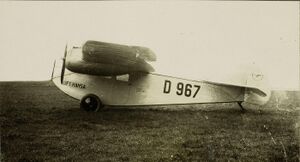Engineering:Focke-Wulf GL 18
| Focke-Wulf GL 18 | |
|---|---|

| |
| Role | Light transport monoplane |
| National origin | Germany |
| Manufacturer | Focke-Wulf |
| First flight | 9 August 1926 |
| Primary user | Deutsche Luft Hansa |
| Number built | 3 (GL18) 4 (GL22) |
| Developed from | Focke-Wulf A 16 |
The Focke-Wulf GL 18 was a 1920s Germany light transport monoplane, designed and built by Focke-Wulf.[1]
Design and development
Based on the single-engine Focke-Wulf A 16 with the nose faired over and fitted with two wing-mounted 58 kW (78 hp) Junkers L.1a inline engines,[1] the GL18 had an enclosed cabin for a pilot and four passengers. The GL18 first flew on 9 August 1926 and was used by Deutsche Luft Hansa until 1932. The next aircraft was the GL 18a variant with two Siemens Sh 11 engines which was followed by the GL 18c with two Siemens Sh 12 engines. The 18a and 18b had slightly wider fuselages. In 1927, a modified Siemens Sh 12-engined variant, the GL 22, was produced. It had a deeper fuselage, the engines were mounted underneath the wings and it had a revised landing gear.[1]
Variants
- GL18
- Twin-engined variant of the Focke-Wulf A 16 with a Junkers L.1a inline engine, one built.
- GL18b
- Siemens Sh 11-powered variant, one built.
- GL18c
- Siemens Sh 12-powered variant, one built.
- GL22
- Revised variant with Siemens Sh 12 engines, four built.
Specifications (GL 22)
Data from [1]The Illustrated Encyclopedia of Aircraft
General characteristics
- Crew: one
- Capacity: four passengers
- Length: 11.00 m (36 ft 1 in)
- Wingspan: 16.00 m (52 ft 6 in)
- Height: 3.00 m (9 ft 10 in)
- Wing area: 32.00 m2 (344.46 sq ft)
- Empty weight: 1,180 kg (2,601 lb)
- Gross weight: 1,820 kg (4,013 lb)
- Powerplant: 2 × Siemens Sh 12 radial piston engine. , 93 kW (125 hp) each
Performance
- Maximum speed: 166 km/h (96 mph, 83 kn)
- Range: 900 km (559 mi, 486 nmi)
- Service ceiling: 3,500 m (11,485 ft)
References
- Notes
- Bibliography
- The Illustrated Encyclopedia of Aircraft (Part Work 1982-1985). Orbis Publishing.
 |


